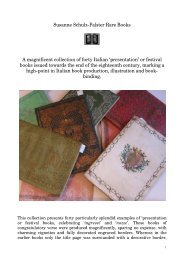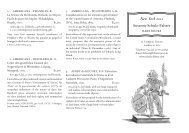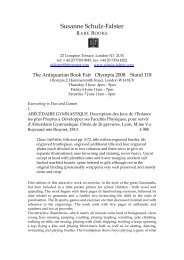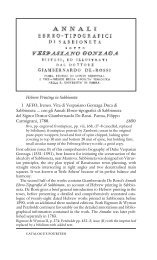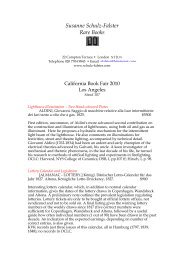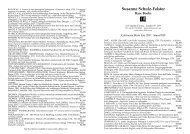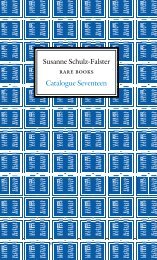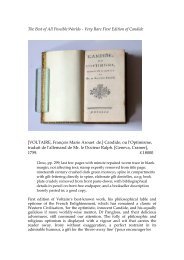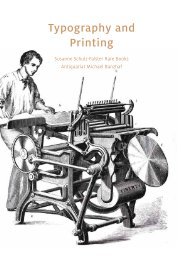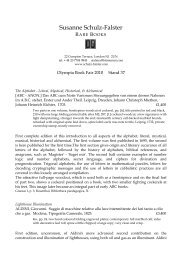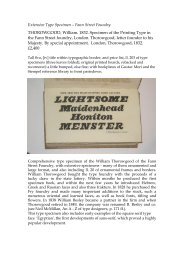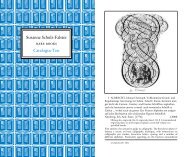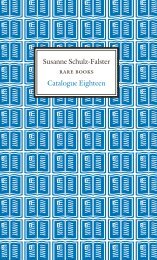Catalogue Number 12 - Susanne Schulz-Falster
Catalogue Number 12 - Susanne Schulz-Falster
Catalogue Number 12 - Susanne Schulz-Falster
You also want an ePaper? Increase the reach of your titles
YUMPU automatically turns print PDFs into web optimized ePapers that Google loves.
een the revitalisation of the economy and the improvement of trade and<br />
commerce.<br />
The anonymous author of this publication expresses his opposition to<br />
the re- introduction of Jews (they had been expelled in 1515), and lists numerous<br />
reasons, why they are to be considered a danger to Christian society.<br />
Throughout he refers extensively to contemporary theological treatises<br />
and papal encyclicals.<br />
He maintains that the Jews would have unfair economic advantages over<br />
the local population. They would not have to serve in the army or militia,<br />
and they were allowed to be involved in Wnancial transactions such as<br />
money-lending with interest, which would lead to extortion and usury.<br />
Despite its rather one-sided approach, the work is of particular interest,<br />
as the author gives very detailed bibliographical details of edicts and laws,<br />
and gives a thorough legal perspective on the settlement of Jews in Italy. He<br />
details speciWc provisions made in individual cities, such as segregation and<br />
ghetto-isation, as well as the limitation of access of the Jews to various professions,<br />
etc.<br />
Very rare, no copy found in RLIN, OCLC, KVK or ICCU.<br />
Man a Machine?<br />
48 [LA METTRIE, Julien OVray de.] L’Homme Machine.<br />
Leyden, Elie Luzac, 1748.<br />
[bound after:] [LA METTRIE, Julien OVray de.] L’Homme Plante.<br />
Potsdam, Voss, [1748].<br />
[bound with:] LUZAC, Elie. L’Homme Plus que Machine. Londres,<br />
[Netherlands, Elie Luzac Wls], 1748.<br />
[bound with:] BEVERLAND, Adriaan (translator). L’Etat de<br />
l’Homme dans le Peché original. Où l’on fait voir quelle est la source<br />
& quelles sont les causes & les suites de ce peché dans le Monde.<br />
Cinquième Edition. Imprimé dans le Monde en 1740. £2400<br />
Four works bound in one volume, <strong>12</strong>mo, pp. [xx], 109; [v], 6–58;<br />
[viii], 140; 296, x; occasionally light foxing, but in all very clean and<br />
crisp; contemporary half vellum over paste-paper boards, gilt-lettering<br />
directly to spine; book-plate removed from front paste-down,<br />
manuscript note listing all four titles on front free endpaper, nineteenth<br />
century ownership inscription by the Joseph Mazzini Wheeler to head<br />
of Wrst title.<br />
Very rare second edition of La Mettrie’s L’Homme Machine. The Wrst edition,<br />
(numbering 108 pages) is virtually unWndable, since most copies had<br />
been destroyed on orders of the Consistoire of Leyden in December 1747.<br />
Attractively this starting point of modern materialism is here found bound<br />
together with the Wrst edition of a contemporary refutation of La Mettrie’s<br />
materialist theories by Luzac, L’Homme Plus que Machine and another work<br />
by La Mettrie L’Homme Plante (Wrst edition, Wrst issue). Also included in<br />
susanne schulz-falster rare books catalogue twelve<br />
this Sammelband is a later edition of the French translation of Fontenai’s<br />
Peccatum originale, on original sin.<br />
La Mettrie’s L’Homme Machine was the most forceful expression of the<br />
anti-religious sentiment of the Enlightenment. In his ‘human machine’<br />
there was no essential diVerence between conscious and unconscious behaviour,<br />
no freedom of will, no rational soul, and no moral good beyond<br />
the perfectibility of the mechanism. In its Wnal consequence, this doctrine of<br />
physiological determinism leaves no freedom to the individual, all human<br />
actions are intrinsically amoral. With his discoveries he expanded the scope<br />
of medicine, a theme which can be found in most of his works. He expected<br />
that medical science (today called psychiatry) would some day be able, by<br />
modifying the state of the organism, to eVect ethical improvements on his<br />
subjects and thus contribute to the well-being of society. The publication of<br />
L’Homme machine caused a scandal even in normally tolerant Holland, and<br />
La Mettrie had to leave the country for fear of being arrested. In this he was<br />
helped by his publisher Elie Luzac.<br />
L’Homme Plante was La Mettrie’s Wrst publication after Wnding refuge at<br />
Frederick the Great’s court in Potsdam. Here he dealt with the question of<br />
generation. He placed man within the scale of beings, and thus suggested<br />
evolution and the interrelation of beings.<br />
L’Homme plus que Machine was the immediate refutation of materialism<br />
by La Mettrie’s publisher Elie Luzac, who himself was also a journalist and<br />
philosophical writer. He rejects the possibility of matter being endowed<br />
with the faculty of thought, and tries to disprove the conclusions of<br />
L’Homme Machine. Judging by Luzac’s other liberal and less restrictive writing,<br />
and the fact that he published an Essai sur la Liberté de Produire ses



